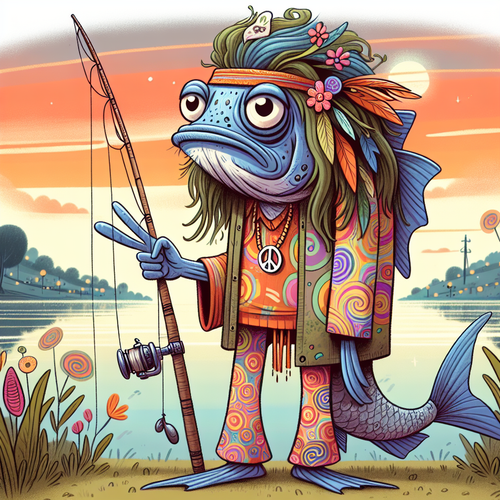
Learning from Slow Days: The Zen of Getting Skunked
Neil ColicchioShare
Spring fishing in New England can be a real struggle. The snowmelt, cold temperatures, and cutting winds create a harsh environment not for the faint of heart. If you're willing to brave the elements, you'll find a new set of challenges waiting below the surface. Sluggish fish, murky waters, and raging currents can test even the most seasoned anglers.
This isn't just a 'Spring' thing, but it's something I've been grappling with after a series of rushed and unproductive trips this year. One of my go-to freshwater spots, the Wachusett Reservoir, is notoriously tricky and slow to fish. I can't help but feel a twinge of envy for those anglers who set back-to-back lake trout records on the 'Chu during opening week. On my best day, I might have caught a smallmouth bass that could serve as bait for those lakers.
*Note that I do not use or encourage the use of bass as bait. Check your local regulations before using fish or other living creatures as bait.
So, what do you do when you can't buy a bite—when the best thing you've caught all day is a record-sized tree branch? As a mediocre angler and semi-professional branch manager myself, I've compiled a list of a few ideas.
Cover Ground
One school of thought says you can cast over the same area and repeat the same retrieve four or five times before the fish become agitated enough to strike. I've found that to be true sometimes, but it's a gamble.
If I'm fishing new waters or uncertain conditions, I'll fan cast over an area—moving clockwise and casting a couple of times at different angles. If the fishing is particularly slow or I've never caught there, I might rotate 45 degrees every other cast. After I cover a 180-degree arc, I'll reset and repeat in another area.
Change It Up
Not getting bites on your favorite chartreuse spinner? Try a spoon. If that's not working, try a jig. You get the idea.
I covered this in an earlier post about getting skunked, so I won't belabor the point. A change of color, lure size, or retrieve can sometimes be enough to get one on the board.
Rest and Refuel
While sitting in a folding camp chair by the riverside or casting from a dock may not be taxing, don't discount the energy it takes to maintain situational awareness and a comfortable body temperature.
This one is essential for you night anglers and surfcasters. When the sun is down, it's a whole different game. If you're feeling the brain fog or you sense yourself slowing down, hydrate and grab a snack. It doesn't have to be a steak and cheese calzone, as I once devoured on a mid-day lake trout excursion, but I wouldn't judge you if it were.
Match the Hatch
Flyfishing enthusiasts already know all about this one. If you've never heard the term, it's about looking at the fauna around you and trying to mimic them with your baits and techniques. Are midges dancing on the surface of the water? Are there fry cruising the shoreline? Think of fish as locavores, i.e., those who prefer to eat local and seasonal cuisine. If you can imitate what they're eating, you'll stand a better chance at enticing a bite.
Talk to the Old Heads
Consider that many anglers fish as an escape—from work, school, family, or any other stressors. Conversing with strangers is often the last thing we want to do with our limited time on the water. Keep your questions short and sweet, e.g., "Any bites?" and spend time listening rather than idly chatting.
I've found few better ways to get a pulse on what's biting, what the water conditions are, and on occasion, score some spare bait or rigging tips. You may not be spoonfed the answer, but a simple "Just yellow perch" from an older gentleman at the boat launch told me what lures to use and where to start searching the day I landed my first fish of 2024 and my personal best yellow perch.
Respect the Skunk
I'm a fishing enthusiast, but I am not a skilled angler. I know a bit of fishing theory, and I've caught some fish I'm really proud of simply by spending hours on the water and trying to learn from better people than me. Unlike your favorite fishing YouTuber, many of my trips are a complete bust in quantity and quality of fish.
I say this because it hasn't deterred me from fishing. Every day I don't catch a fish, I'll likely spend another week reading, watching videos, and scouring forums. For every hour I spend aimlessly drifting in a kayak, there's an hour that I'm observing wind, current, and bottom. Perhaps most importantly, every time I bring a friend out and catch nothing alongside them, I spend quality time with my friends and try to rid them of the notion that fishing is a sport for experts or for people who grew up with it.
I wouldn't quite say I'm proud to be skunked, but I take great joy in fishing somewhere challenging. Similarly, I don't live to outsmart my quarry, but I respect a formidable predator in any context. Even the tiny panfish and snapper that have stripped countless baits from my hooks have left me in awe.
The phrase "That's why they call it fishing and not catching" takes on a whole different meaning when you stop to appreciate the "not catching" moments. Challenges like these remind me of our responsibilities as conservationists and advocates for accessible outdoor spaces. These experiences inspire me to share this sport with my friends, my son, and my readers.
Neil Colicchio
Owner, New Dawn Tackle Co.



